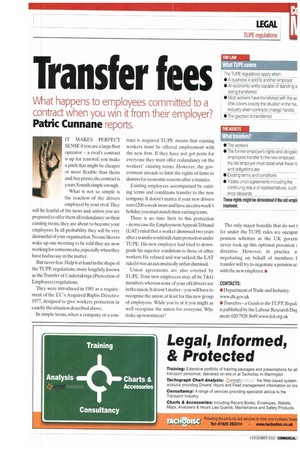Transfer fees
Page 37

If you've noticed an error in this article please click here to report it so we can fix it.
What happens to employees committed to a contract when you win it from their employer? Patric Cunnane reports.
IT MAKES PERFECT SENSE if you are a large fleet operator a rival's contract is up for renewal; you make a pitch that might be cheaper or more flexible than theirs and, hey presto. the contract is yours. Sounds simple enough.
What is not so simple is the reaction of the drivers employed by your rival. They will be fearful of the news and. unless you are prepared to offer them all redundancy on their existing terms, they are about to become your employees. In all probability they will be very distrustful of your organisation.No one likes to wake up one morning to be told they are now working for someone else,especially when they have had no say in the matter.
But never fear. Help is at hand in the shape of the TUPE regulations, more lengthily known as the Transfer of Undertakings (Protection of Employees) regulations.
They were introduced in 1981 as a requirement of the EU's Acquired Rights Directive 1977, designed to give workers protection in exactly the situation described above.
In simple terms, when a company or a con tract is acquired TUPE means that existing workers must be offered employment with the new firm. If they have not got posts for everyone they must offer redundancy on the workers' existing terms. However, the government intends to limit the rights of firms to dismiss for economic reasons after a transfer.
Existing employees accompanied by existing terms and conditions transfer to the new company. It doesn't matter if your new drivers earn 1200 a week more and have an extra week's holiday; you must match their existing terms.
There is no time limit to this protection -in one case the Employment Appeals Tribunal (EAT) ruled that a worker dismissed two years after a transfer could still claim protection under TUPE. His new employer had tried to downgrade his superior conditions to those of other workers. He refused and was sacked; the EAT ruled it was an automatically unfair dismissal.
Union agreements are also covered by TUPE. Your new employees may all be T&G members whereas none of your old drivers are in the union. It doesn't matteryou will have to recognise the union, at least for this new group of employees. While you're at it you might as well recognise the union for everyone. Why stoke up resentment? The only major benefits that do not 1 fer under the TUPE rules are occupat pension schemes as the UK govern never took up this optional provision ( directive. However, in practice ii negotiating on behalf of members f transfer will try to negotiate a pension in with the new employer..
CONTACTS: • Department of Trade and Industry: www.dti.gov.uk • Transfersa Guide to the TUPE Regale is published by the Labour Research Dec men t: 020 7928 3649; www.Ird.org.ulc
































































































































































































